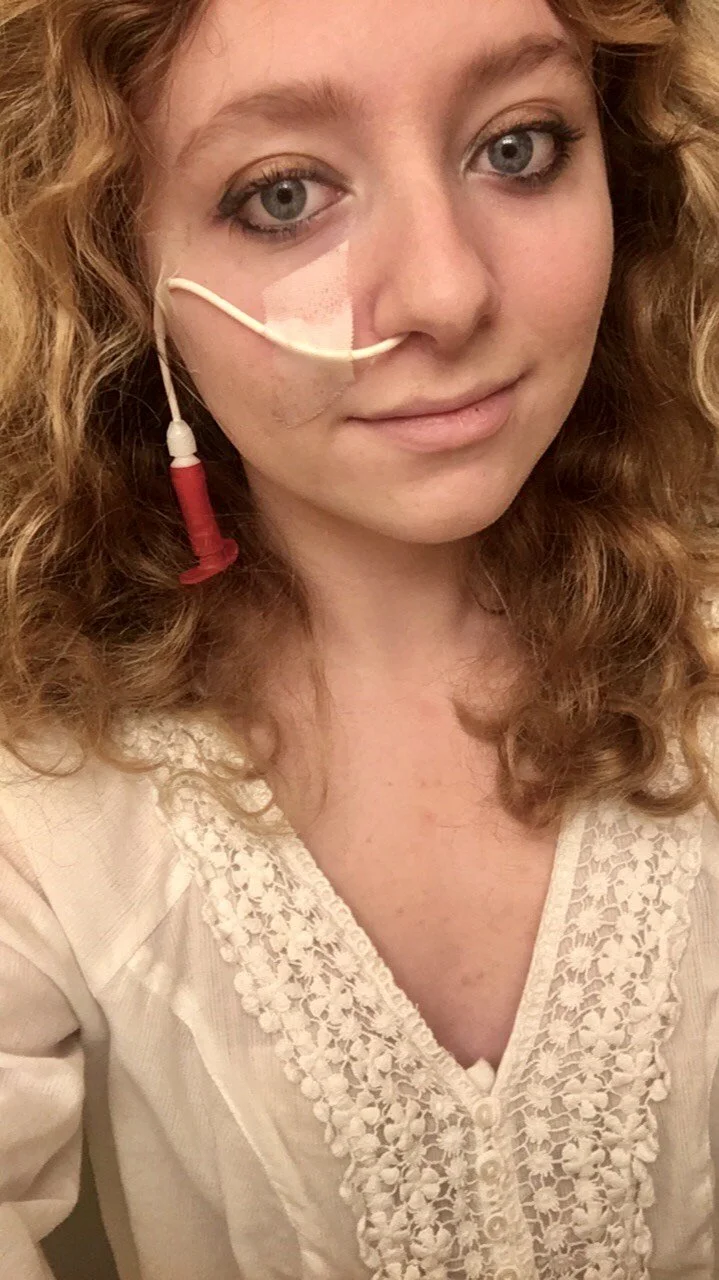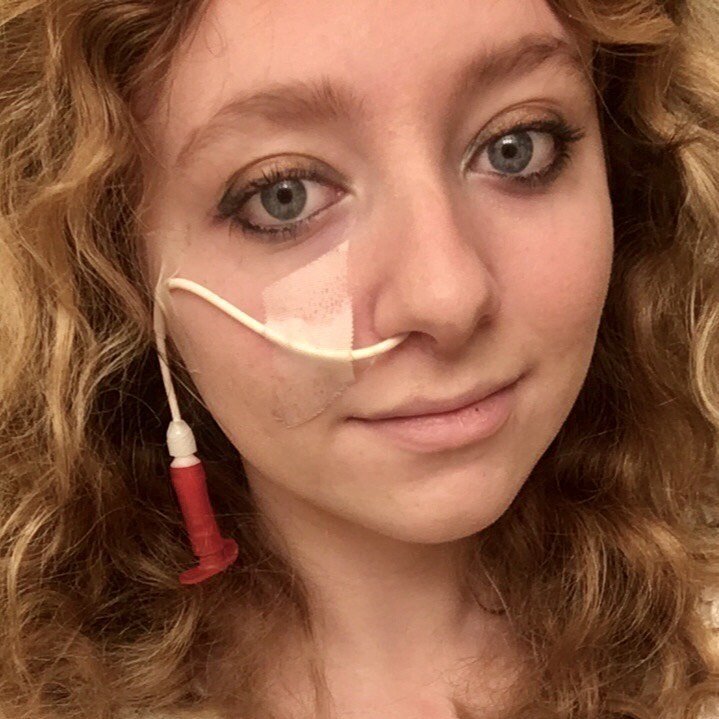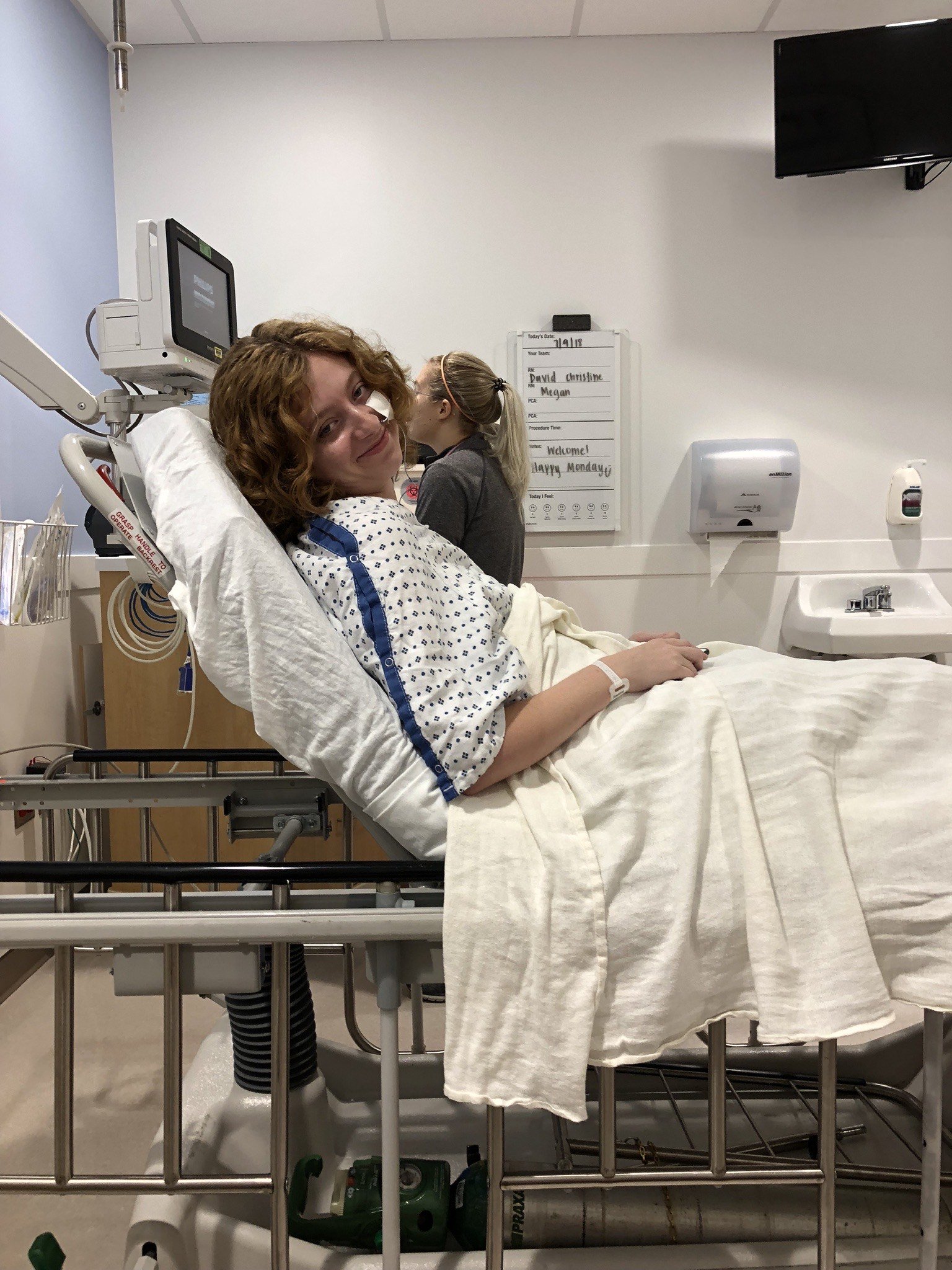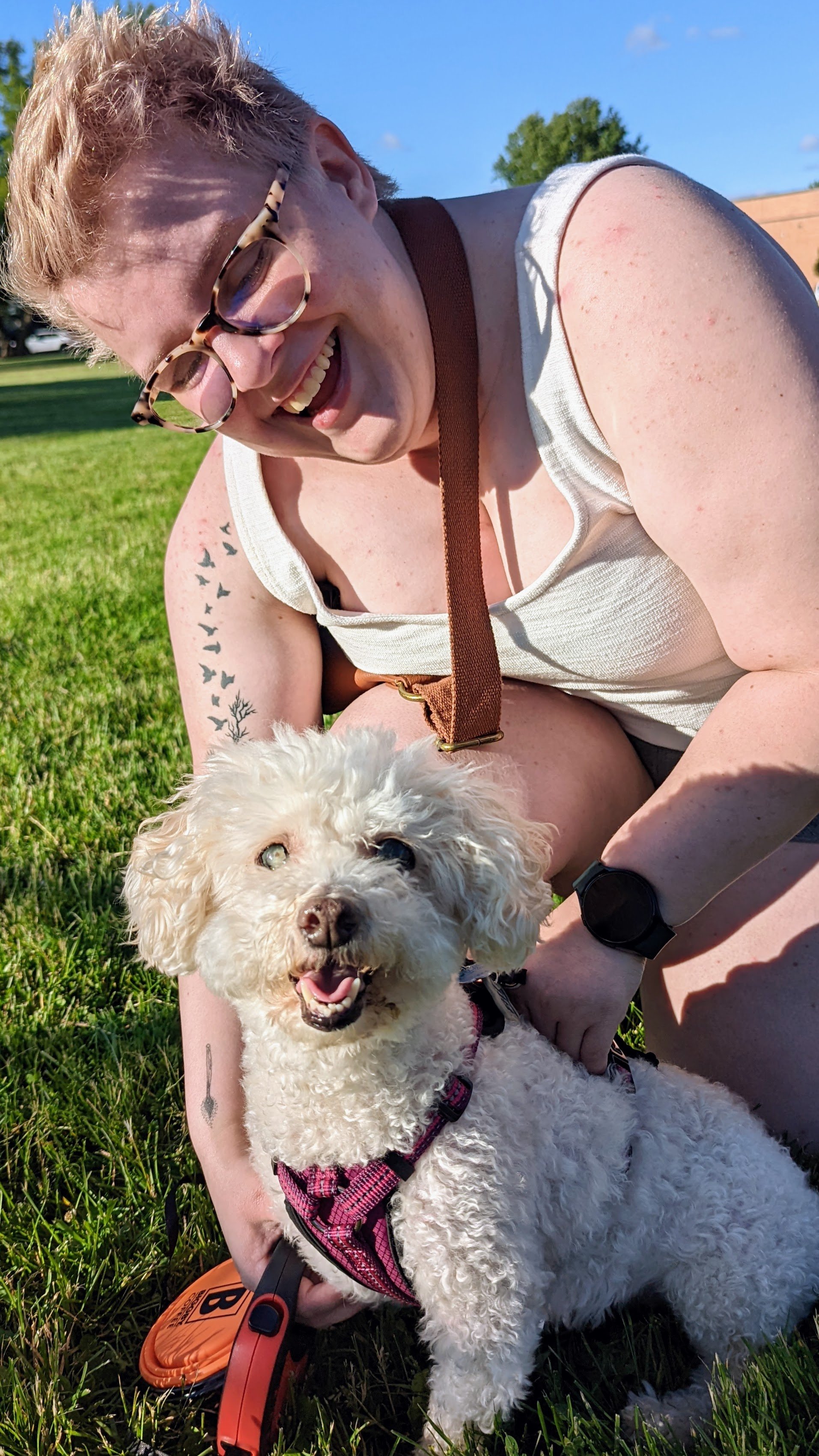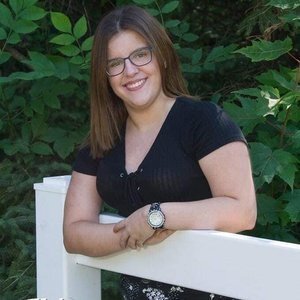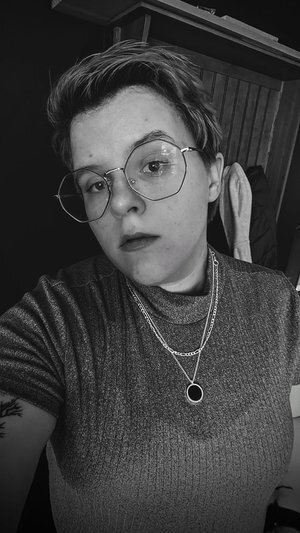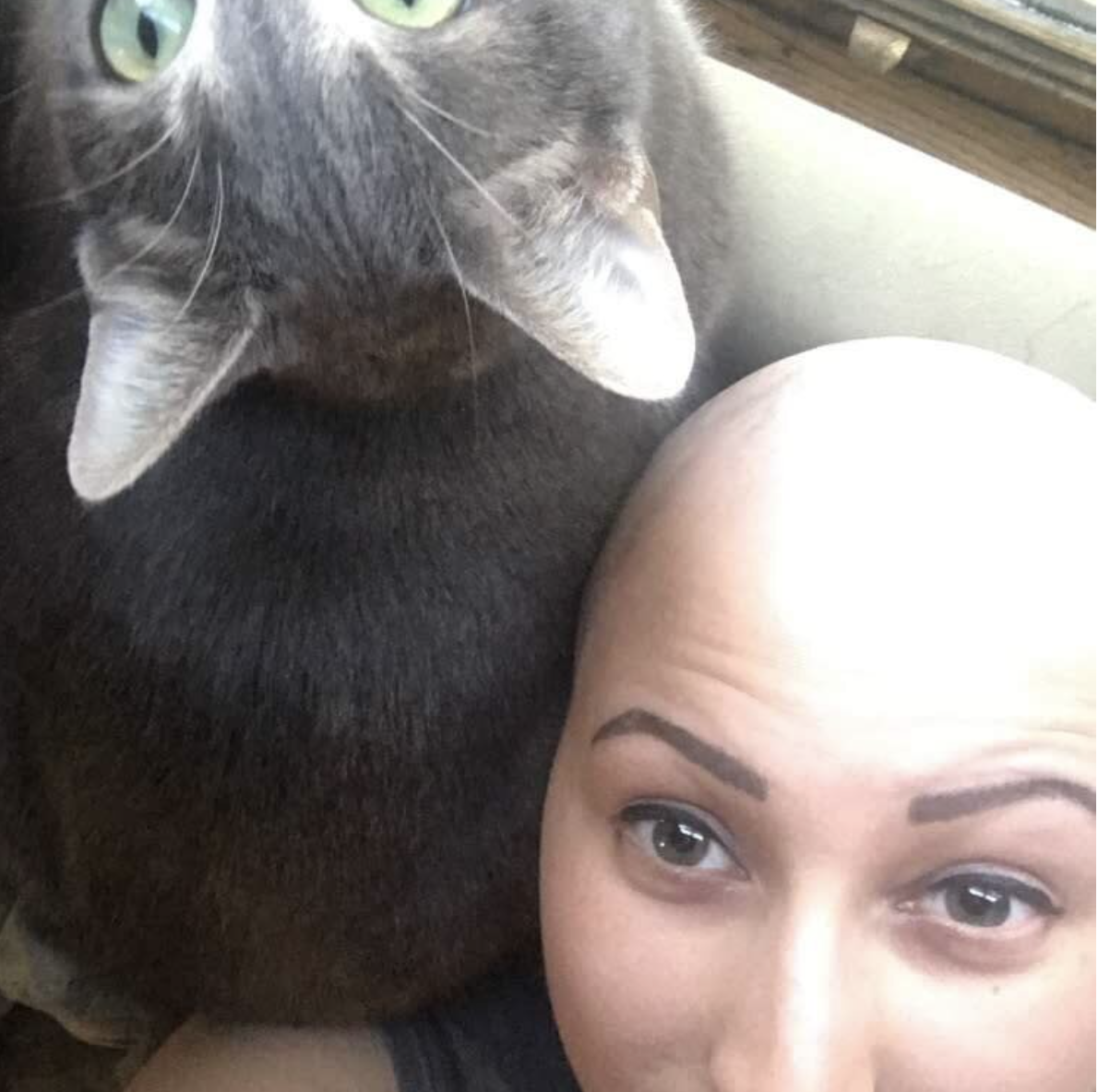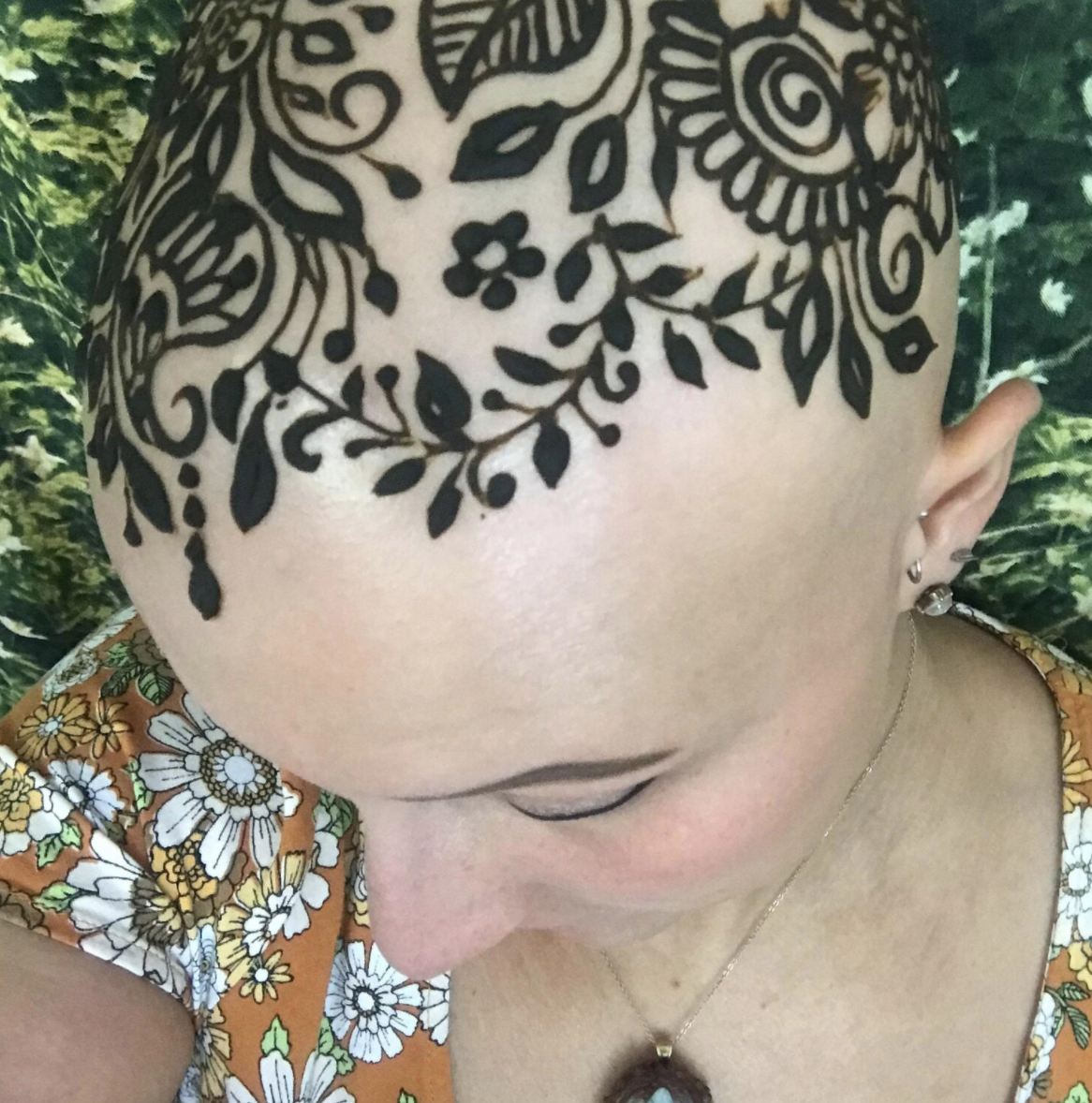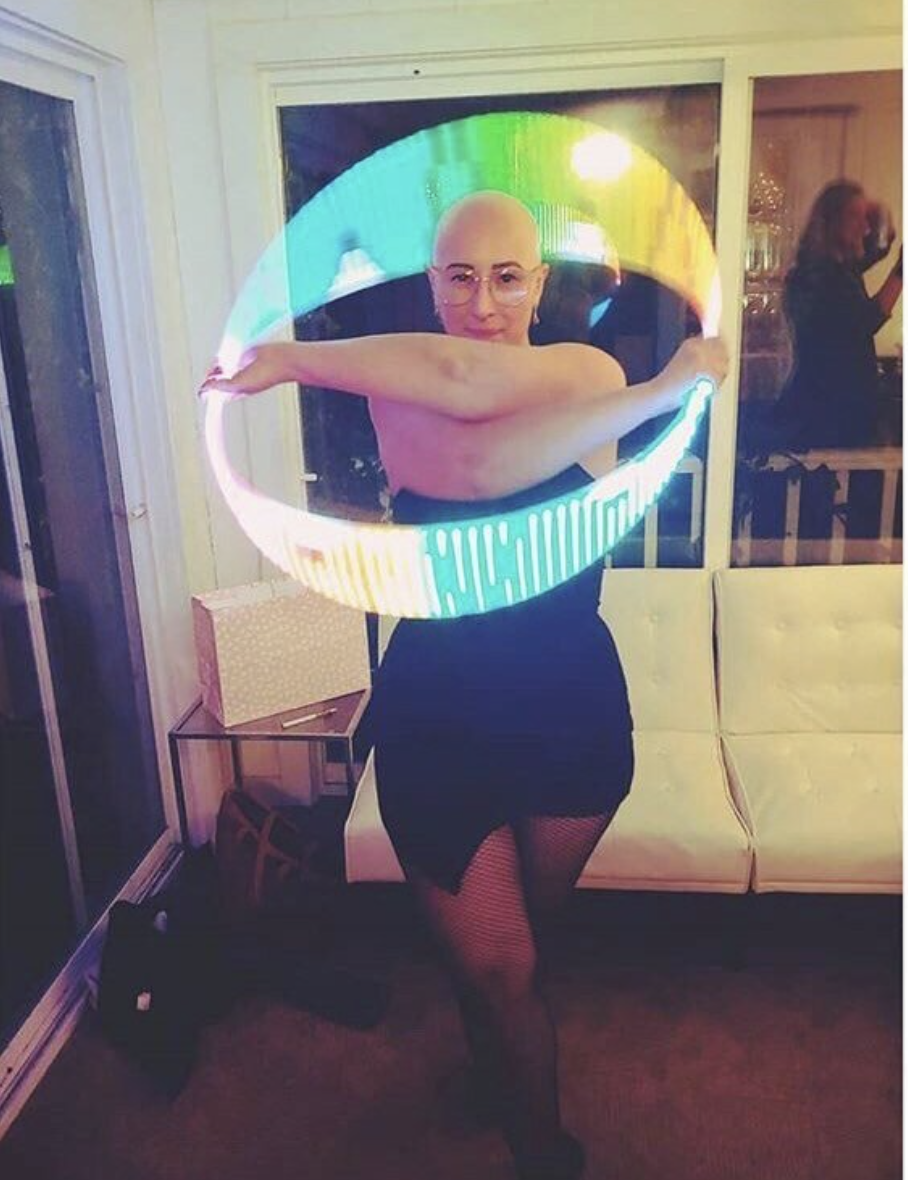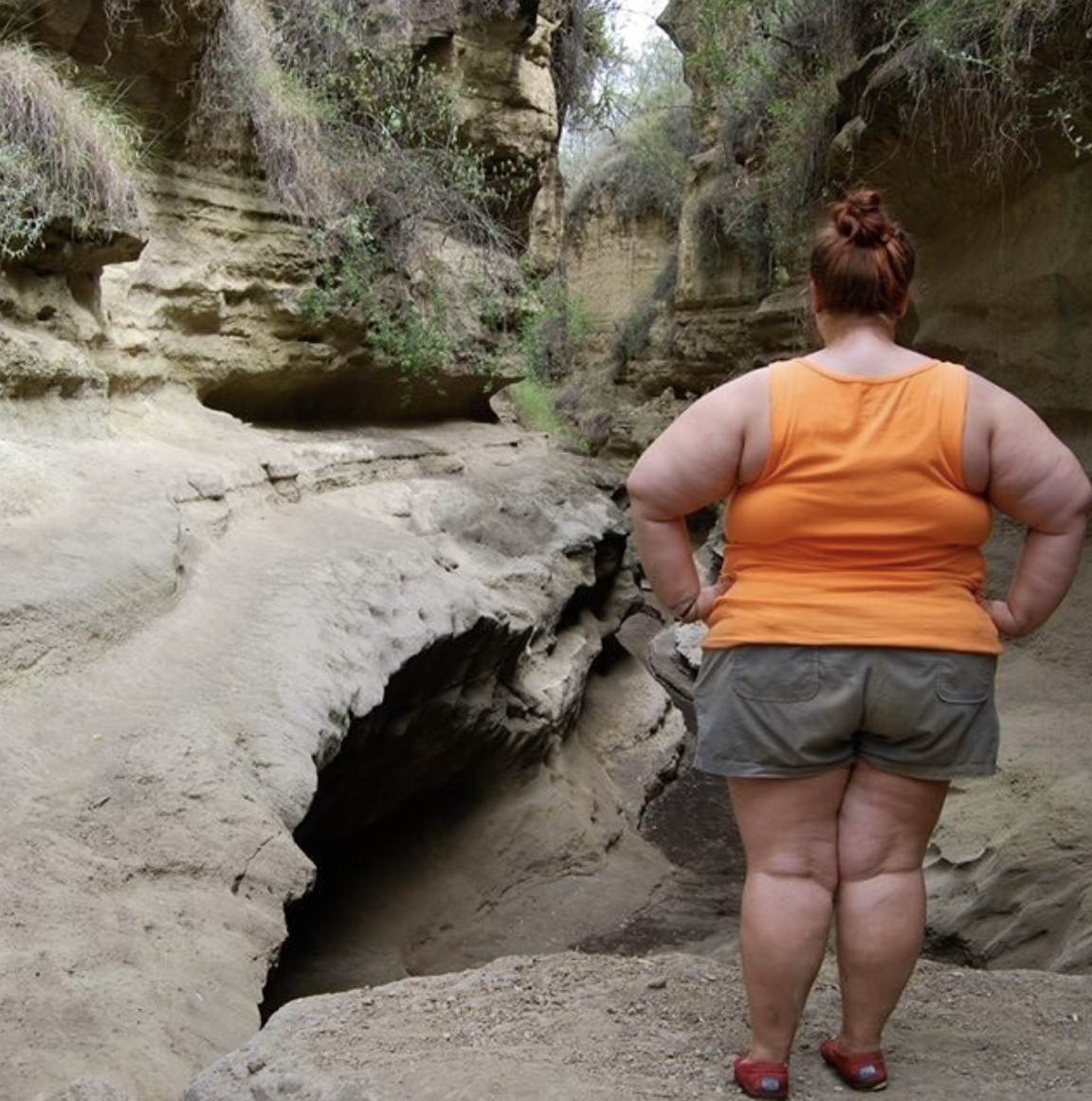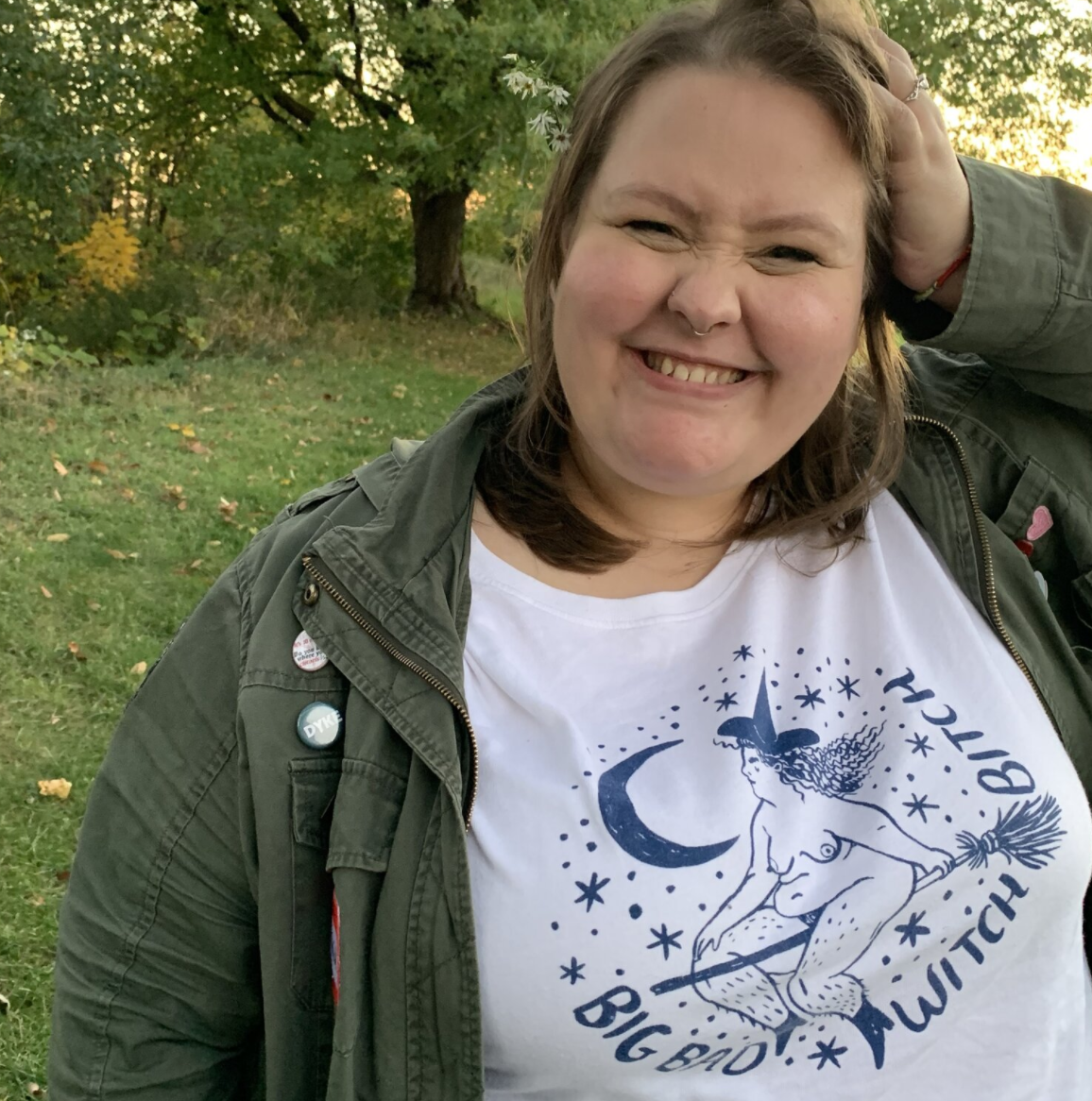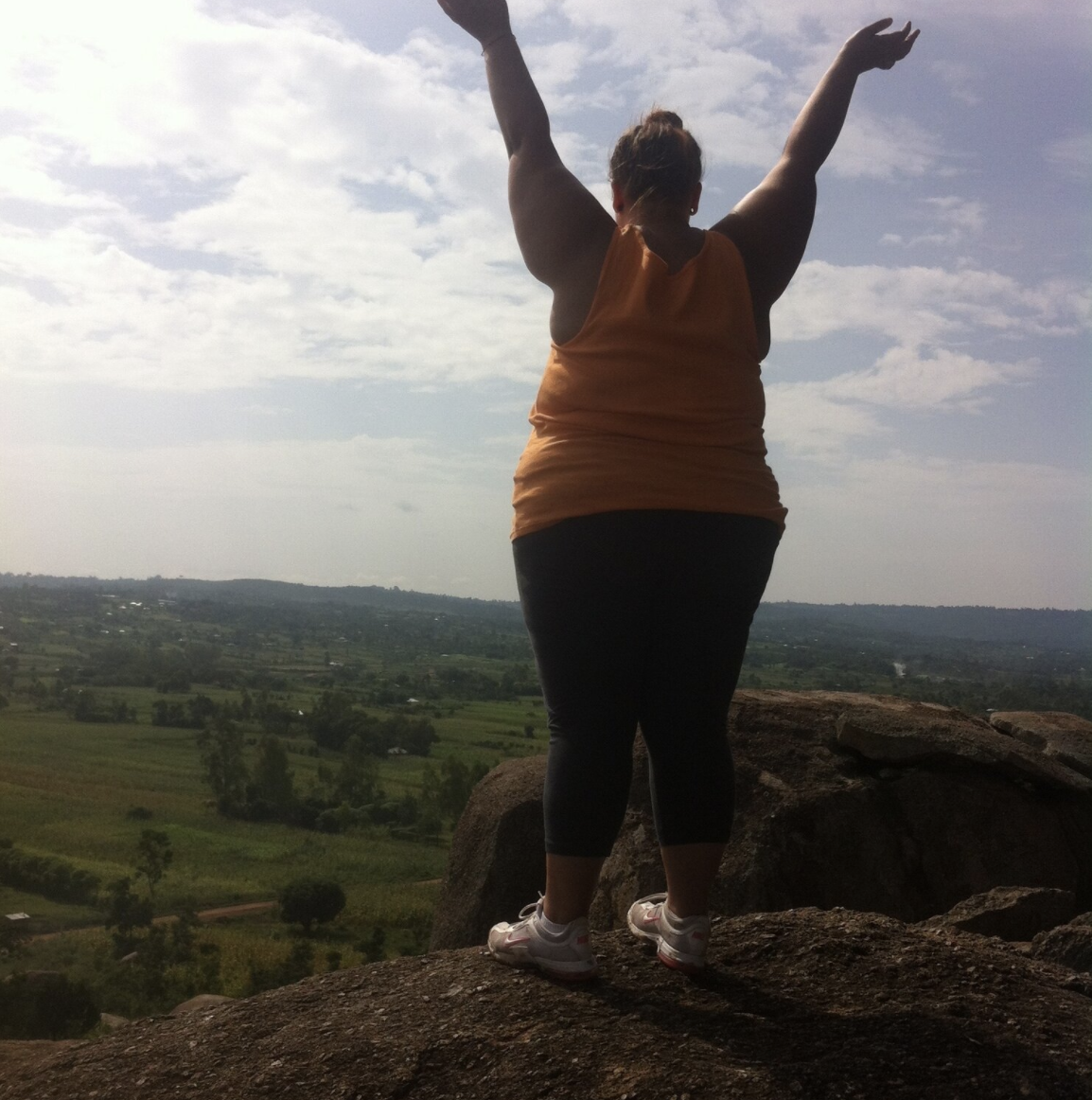Annelise - “A healthy body to me is one that keeps you alive and allows you to be as capable as you can be.”
Growing up, I had a stereotypical “normal” body. I was by no means the smallest or the largest person my age and medically I was very much so in the middle ground statistically. This all changed when I was 16. Randomly, my body began rejecting food almost entirely. I went from a very typical existence to struggling to even keep down something as simple as an egg or saltine crackers. To the external world, there was no visible signs of illness, but I quickly began to lose weight. This naturally alarmed my doctors and I had an onslaught of appointments and pharmaceutical interventions which all failed. I had a flurry of tests and was finally diagnosed with gastroparesis (or essentially the paralysis of the stomach) about a year after I became sick. I have had many tests performed since and a gastroelectrical stimulator (akin to a pacemaker) implanted in my stomach. I was lucky enough to receive a Smart Pill test down at Cleveland Clinic which showed that not only was my stomach delayed in terms of motility, but my entire digestive system was. The test was performed over 7-10 days and afterwards the pill capsule was still in my digestive system. I was finally later diagnosed with Hypermobile Ehler’s Danlos syndrome (which is a mutation of a type of collagen in the body) and Mast Cell Activation Syndrome, both are believed to cause all of my gastric issues.
Q & A
WHAT EXPERIENCES IN YOUR LIFE HAVE HAD THE BIGGEST EFFECT ON YOUR BODY IMAGE?
As I didn’t have answers for a long time as to why I was sick and high school being the often unkind place it is, I had multiple rumors spread about me that I had anorexia and bulimia due to my vomiting and that I was seeking treatment that when I missed school . The lack of explanation for my suffering and judgment from my peers definitely contributed to a resentment of my body. This was only furthered by my GI doctor at the time at U of M repeatedly refusing to try some treatments unless I was under 95 pounds. He was not alone in this devaluation of my illnesses and suffering, because I could easily mask it with some baggy clothes. It led to me developing a very distorted relationship with food that continues to this day and actively avoiding it to provide proof I am actually sick. I only started to be believed once I got my nasal feeding tube and later, my permanent feeding tube. Finally, there was visible proof that something was actually wrong with me, that I needed intervention to survive daily life. People instantly became kinder, more compassionate, and less argumentative with me.
Being believed was a double edged sword though. I had finally gotten down to weighing approximately 90 pounds at the time my feeding tube was inserted. I was very thin, but I was working as a barista at a coffee shop as I took a year gap in my schooling due to my illnesses, and I would constantly get compliments about my appearance. Guys would very often ask for my number and vocalize appreciation for my thinness. I finally fit society’s view of attractiveness and was a size 0. I had never loved my body more than then, and even as I slowly got better and could eat more, I refused to in order to keep the weight off, despite the fact I was underweight.
WHAT STEREOTYPE DO YOU FEEL ARE ASSOCIATED WITH YOU AND YOUR BODY?
The stereotype I see most prominently is that I don’t have serious medical issues or disabilities because there is nothing visibly wrong with me. I have been confronted and yelled at numerous times by people in parking lots for using my doctor issued permanent handicap parking placard because I’m seemingly “young and healthy.” The second stereotype is that thin is healthy, active, and attractive in society. In recent years, there has been a push for change in social media and ad campaigns and I am happy to see that. I was my most inactive and most unhealthy when I was my thinnest. Finally, scars and imperfections are ugly. I have started to learn to love all of my surgical scars that cover my abdomen (four alone in my belly button). They are a testament to what a person has overcome in their life and a part of their story that should instead be celebrated, whether it be scars, cellulite, stretch marks, or wrinkles.
WHAT DOES A HEALTHY BODY MEAN TO YOU?
A healthy body to me is one that keeps you alive and allows you to be as capable as you can be, while also being happy. That looks different for every person because we all have our unique struggles in life as well as our own goals. For me, that means maintaining a normal weight, being able to be at least somewhat active, and being able to chase my intellectual pursuits.
HOW DO YOU FEEL WE CAN SEE BODIES DIFFERENTLY AND HELP OTHERS DEVELOP A HEALTHIER BODY IMAGE?
I think we need to stop putting so much emphasis on the appearance of our bodies in general, especially our flaws. Everyone has flaws and it should be normal to simply acknowledge their existence. A person doesn’t have to love their flaws. I see them as only a sentence in a book. They contribute a bit to the story, but what we do, who we are, and who we impact are far bigger chapters. Our bodies are our vessels to life here on earth and they are what get us through every day. We should each take care of them, respect them, and even celebrate them, but they are also not who we are as an entire person.
That being said, I think it would be beneficial to further represent a diversity of bodies in popular culture and media. More importantly, highlighting this diversity as normal. And to stop putting an emphasis on projecting perfection to mass audiences, primarily through social media. There has been a shift towards this recently with brands like Aerie using a variety of models with different features and sizes, and also a number of people like Ashley Graham or Lizzo advocating for body diversity and acceptance, but there could be more, especially in the masculine side of things. Being able to see people similar to one’s self or with similar flaws helps make us more secure in our own flaws and make them a more normal part of life.
WHAT DO YOU LOVE AND APPRECIATE ABOUT YOUR BODY?
I love my body’s resiliency and appreciate it fighting to keep me alive despite all the parts of it that don’t work properly. I love that my body enables me to spend time with the ones I love and do the things that I love, even if that comes with limitations due to my illnesses. I still have the ability to decide what I want to do everyday, explore new things, and shape how my future will look. My body is simply the thing that will carry me through all of that. I appreciate my body’s ability to heal. Each one of my many scars is proof that I went through something hard, overcame it, and moved on from it. That my life can continue progressing forward.
WHAT IS A SHORT PIECE OF ADVICE YOU CAN GIVE TO OTHERS THAT MAY SHARE A SIMILAR EXPERIENCE?
Don’t be too hard on yourself if you are struggling. Talk to yourself like a friend. If it helps, imagine taking care of a friend and treat yourself how you would treat them. And you don’t have to listen to anyone else’s opinions about you or your body. Most people have no idea what another person is going through because a lot of it can be invisible but that doesn’t make it less valid or a person less worthy. Just do the best you can for yourself everyday, know that your best will probably look very different from day to day, and some days your best might just be getting out of bed.
#SeeBodiesDifferently #MidwestBrokenMirror
Sydney - “My body image quickly became a problem when I was around 12, around two years after my parents divorced.”
Whenever someone comments on your build, you go on autopilot, and for me, this happened for the first time when I was 12. The first time I was looked at from head-to-toe by family members, I was immediately aware that I was not “average.” As a young child, I grew up in a very comforting home; my parents were sound, I had an older sister, and I was truly the happiest I’d ever been. My body image quickly became a problem when I was around 12, around two years after my parents divorced. I would eat out of boredom, of sadness, of happiness—any emotion you can think of, and I was eating it. I developed depression as a result of the divorce, and this only heightened my ability to eat my feelings. It allowed me an excuse to eat whatever I wanted, whenever I wanted to. It gave me an out that I thought I deserved, an out that I believed I would never let get past 120lbs. The doctor terrifies me to this day, as each time, they weigh you as procedure; each time, I stare at the number on that scale and start berating myself. Telling myself that I am disgusting, fat, never able to lose weight. Telling myself that I am worth nothing more than the food I shove into my mouth. As a result of emotional eating, then restricting, I 10,000% believe I have an eating disorder, but have never been formally diagnosed.
Q & A
IN WHAT WAYS HAS BODY CULTURE INFLUENCED THE PERSPECTIVE OF YOUR BODY?
When my parents got divorced, I instantly fell into a state of depression, eating and eating anything we had in the house. Was I hungry? I didn’t know. I didn’t care. That’s when people began viewing my body as an object rather than a human with feelings. Some family members would comment on my weight from the minute I turned 12, but they did it subtly, like “Are you sure you need that second plate?” or “You need new jeans again?” I became obsessed with staring at my stomach, pinching my thighs, making sure that I didn’t walk so quickly that you could see the jiggling of my hips. I would scroll through Instagram and see friends at the gym and think, “Why can’t you do that?”. I would throw up in bathroom stalls. I’d shrug off the worried glances from my friends and teachers as I slowly became smaller and smaller. I would eat secretly at night and then starve myself for a few days, or only eat once a day. It was like I was high; literally feeding off my own body fat, knowing that I was causing damage, but not having enough self-esteem to care.
DO STEREOTYPES EXIST FOR YOUR BODY?
As a 4’10” individual, I have always been stocky in the middle areas (hips, thighs, stomach). As much as I want to believe that this is normal, that this is okay, I simply cannot bring myself to recognize that. As a queer person who identifies as a lesbian, there are so many images of women who are skinny and not at all carrying weight like I have had to my entire life. This has made me feel invalidated, as I cannot imagine someone my size being able to find love or acceptance within a partner, let alone myself.
WHAT DOES A HEALTHY BODY IMAGE MEAN TO YOU?
To me, a healthy body means an accepted one. One that may have stretch marks, larger thighs, facial and body acne…you name it. One that others may seem as larger, as different, as abnormal. One that you can walk around and know that you’re a valued person, with feelings and emotions that matter.
DO YOU LOVE AND APPRECIATE ASPECTS OF YOUR BODY?
I truly, wholeheartedly, love my eyes. As far as I know, I am one of three (other two being my cousins) people in my immediate family to have green or hazel eyes. Mine are a murky green that kind of resembles a forest, but a forest that is lit by sunlight instead of moonlight. They are by far the one thing I would never change about myself.
WHAT IS A PIECE OF ADVICE YOU CAN GIVE TO OTHERS THAT MAY SHARE SIMILAR EXPERIENCES?
Society needs to change. While self-acceptance is something that comes with time, the body influencers and “body positive” community have already determined what is acceptable. As for advice, I’ll quote something that my therapist said to me one summer day: “Your weight does not define your worth to the world.”
#SeeBodiesDifferently #MidwestBrokenMirror
Katlyn - "Through my challenges with alopecia I was faced with redefining my own beauty standards.”
It all begins with an idea.
If you were to ask me four years ago what my favorite thing about myself was, I would have, without hesitation, said “my hair”. In my eyes, my hair was one of my most defining features and greatest sources of confidence. “Who am I going to be when all of my hair falls out?”, was one of the many thoughts racing through my mind as I secretly collected a fistful of hair under my desk in the middle of my master’s class. “What are people going to think of me?”, I worried as I watched hair clog up the shower drain. “How am I or anyone else ever going to love me?”, I thought, tears running down my face as I brushed out clumps of my golden-brown locks. I tortured myself with these thoughts over the course of six months as I lost my hair, eyelashes, eyebrows, and all other hair (yes, ALL hair) on my body. I have alopecia; an autoimmune disorder that causes hair loss. And even though I’d been diagnosed with this condition since the age of ten, losing quarter-sized patches of hair every few years or so that would eventually grow back, I never imagined that I might one day be bald. My family and friends were more than supportive and encouraging of my hairstyle change. But, as I continued to lose more and more hair, I was filled with this feeling that my own body was betraying me. Nothing I was doing was helping, not even the painful steroid injections in my scalp. “How am I ever going to feel beautiful?”, I shamefully thought as I scrolled through my Instagram feed of women, not a single one of them without hair. Shame grew to anxiety as I felt my confidence and identity crumbling around me. It wasn’t until I saw Jeana Turner, an alopecian model, on America’s Next Top Model, that I gained the courage to go fully bald. After hearing her story and seeing her go through the same struggle, I knew I could do it too—I could be a baldie. The day I ran may clippers down the middle of my head was one of the most empowering moments of my life. I was no longer hiding my alopecia, and in that moment, the weight of my shame and anxiety was lifted. I relate my journey with alopecia with the life cycle of the lotus flower. The lotus flower is unique because it starts its life underwater, buried in the mud. The plant slowly works its way through the muck to the surface of the water to bloom into a beautiful flower. In Buddhist tradition, the lotus flower represents the challenges we must go through in life to reach enlightenment. Through my challenge of hair loss my misconceptions of beauty were broken down and I experienced a radical shift in my body image. In our society, we are primed to define beauty by outward traits and are constantly exposed to unrealistic beauty standards—thin, tan, photoshopped models with beautiful hair. Through my challenges with alopecia I was faced with redefining my own beauty standards. And if you were to ask me today what my favorite thing about myself is, I’ll say my kindness, empathy, and creativity. I now know that there is so much more to me than my hair and my outward appearance and I have truly never been more comfortable in my skin, bald head and all. Of course, there are still days where I feel self-conscious, but I’m no longer defining my entire being on the way I look, and that was my own enlightenment in my journey toward self-love.
Q & A
DO YOU HAVE TO ADDRESS STEREOTYPES ASSOCIATED WITH YOUR APPEARANCE?
I frequently have people ask me if I have cancer or assume that I shaved my head by choice. These assumptions are not correct. I try to take those moments as an opportunity to educate and raise awareness about alopecia, which helps me find peace in dealing with intrusive questions and assumptions.
WHAT DOES A HEALTHY BODY IMAGE MEAN TO YOU?
Having a healthy body image means being accepting and appreciative of your body. You don’t have to necessarily love or even feel positive about your body to be able to appreciate your body and all that it does for you.
WHAT DO YOU LOVE AND APPRECIATE ABOUT YOUR BODY?
First and foremost, I love and appreciate my bald head for helping me expand my own understanding and experience of beauty. I also love and appreciate my smile for helping me express and spread love to others. And I love and appreciate my legs for allowing me to dance through life.
HOW DO YOU FEEL WE CAN SEE BODIES DIFFERENTLY AND HELP OTHERS DEVELOP A HEALTHIER BODY IMAGE?
We can start to see bodies differently by understanding that no bodies are alike. There is really no point in trying to define bodies as “good” or “bad”, no reason to place judgments on others’ bodies, and no reason to compare our own bodies to others. Every single body is different and unique.
WHAT IS A SHORT PIECE OF ADVICE YOU CAN GIVE TO OTHERS THAT MAY SHARE SIMILAR EXPERIENCES?
“I am not this hair. I am not this skin. I am the soul that lives within.”- Rumi—I found much peace in this quote when I was going through my hair loss journey. It helped me begin to understand that we, as human beings, are so much more than what one sees on the outside. We are complex beings with the capacity to love, spread kindness, empathize, create, and share knowledge, none of which has anything to do with our looks, skin, or hair.
#SeeBodiesDifferently #MidwestBrokenMirror
Janelle - "My value isn’t tied to my body."
It all begins with an idea.
I have always been a fat person or had a bigger body than some of the other folx around me. I was teased a lot in grade school for being fat and kids would tell me that I could never win at the schoolyard games because I was too fat to run. When I was in middle school I moved to a much more white and affluent area that laid on the shame in a much thicker form. I was othered by many of the people around me and it was made much plainer that I was not going to be accepted due to my fat body. Boys at my school either deeply sexualized my body because it was more developed than the other girls around me or made me feel like I was disgusted for being fat. Things began to shift when I was in high school because I transferred schools again and went to a school that was predominantly black and the students there viewed my body differently. I looked like others there and I was viewed as attractive. After that point, I viewed my body in a rather neutral manner, but always imaging that someday I would lose weight or have a strong desire to "take care of myself." At that point I had interalized a lot of fatphobic beliefs, but just thought it was normative. I have been called horrible names. I have been fetished in gross and uncomfortable ways. I have been told that I don't care about myself and that I'm going to die. I became terrified of doctors. In my early/mid 20s I started exploring body positivity and it completely flipped the way I viewed my body. I was able to see that my value isn't tied to my body and even if it was, that my body deserves to be celebrated. I am certainly still a work in progress, but now I feel confident that I am worth the work and no one will ever make me feel like I have to change my body in order to be treated with respect again. Ever.
Q & A
WHAT EXPERIENCES IN YOUR LIFE HAVE HAD THE BIGGEST EFFECT ON YOUR BODY IMAGE?
Honestly finding the podcast "She's all fat" - that was my introduction to the concept of body positivity and allowed me to find a community of fat people who didn't hate themselves and didn't view their current fat bodies as temporary bodies that needed to be changed. Being able to hear all my thoughts and feelings reflected back to me from complete strangers empowered me and changed my whole relationship with my body.
WHAT STEREOTYPES DO YOU FEEL ARE ASSOCIATED WITH YOU AND YOUR BODY?
People generally assume that I am lazy and/or super "unhealthy" because I am fat. There is a strong assumption that I only eat "bad" or "junk" food as well.
HOW DO YOU ADDRESS PEOPLE THAT FAT-SHAME OR CRITICIZE YOU AS GLORIFYING AN “UNHEALTHY” LIFESTYLE?
Honestly a lot of the time I ignore them; it's not my job to make them feel differently about my body because I know the only opinions and feelings that matter are my own. If I do engage I ask questions about what they deem as healthy and where they learned that or ask them about their assumptions. Mostly I want them to feel stupid for making assumptions about me when in reality they know nothing about my "lifestyle" or my relationship with my body and I want them to see how harmful that is to the other fat people in their life because if they feel alright doing it to me they certainly will do it to others.
WHAT DOES A HEALTHY BODY IMAGE MEAN TO YOU?
I think it means feeling confident that my body is my own, for appreciating all that it can do for me and does do for me. It means knowing that I am allowed to make my own choices and that no one knows what me and my body experience but me and my body. I am allowed to make changes if I want to, but that there is no obligation, moral or otherwise, to look any certain way or live in kind of "lifestyle." For me, "healthy" means knowing that me and my body are a team, not enemies and that only I get to decide if we are going to be a team that works together. My goal in life is to experience as much joy as I can and I'm never going to have an experience that my body is not included in. I want my body to be there with me in my joy, not something I see as a barrier to that joy
DO YOU LOVE AND APPRECIATE ASPECTS OF YOUR BODY?
Absolutely I do. I appreciate and love that my body is strong, that it carries me through this world, and holds me in every moment. I love that my body is mine. I love the art that I have added to my body and that having a fat body gives me a bigger canvas to carry the things that are important to me. I LOVE my tattoos. They are something that I originally started getting to increase my love for my body. I made a choice to pick parts of my body that I had hated before like my upper arms and thighs and now I love those parts of my body. I want to show them off now and I really love my arms and legs now.
HOW DO YOU FEEL WE CAN SEE BODIES DIFFERENTLY AND HELP OTHERS DEVELOP A HEALTHIER BODY IMAGE?
I think we should start seeing bodies as their own and stop expecting there to be a "one size fits all" mentality. Every body is unique and there is no ONE version of "health" so we need to stop subscribing to that idea. I also wish that people were taught from a young age that their body is their ally and can help them achieve their goals, not be something that needs to be overcome or changed in order to be worthy. Like many things in life, if we were taught to lead with love and curiosity a lot of us would experience our bodies differently.
WHAT IS A SHORT PIECE OF ADVICE YOU CAN GIVE TO OTHERS THAT MAY SHARE SIMILAR EXPERIENCES?
Your body is your own and there is no wrong way for it to exist. You can make changes if you want to, but make sure it's rooted in YOU and what YOU want. And learn to listen to your body, it talks to us and it sucks to be ignored and you don't have to do to yourself. Also read "The Body is Not an Apology" by Sonya Renee Taylor - it's an incredibly powerful book that allows some guidance in how to lead with love and curiosity.

